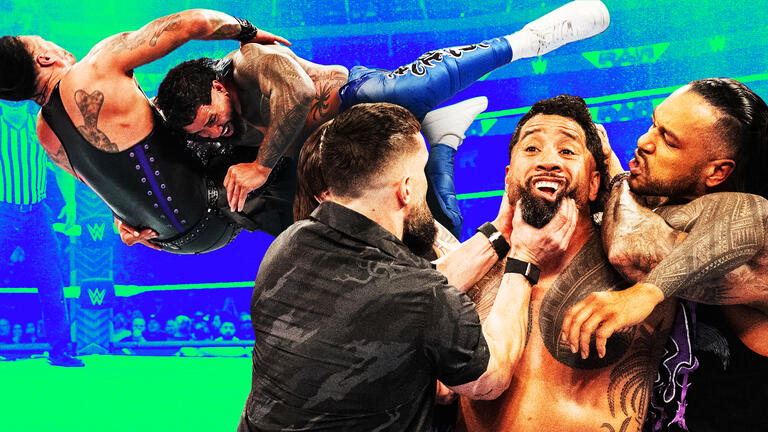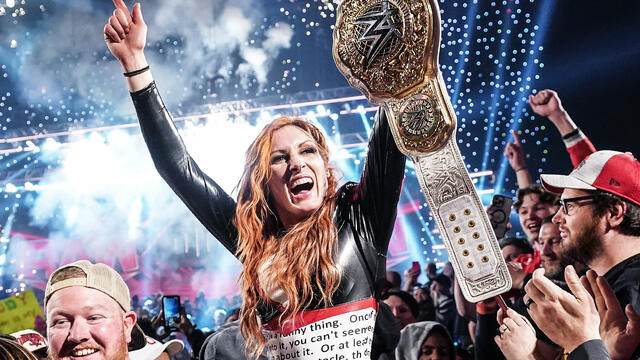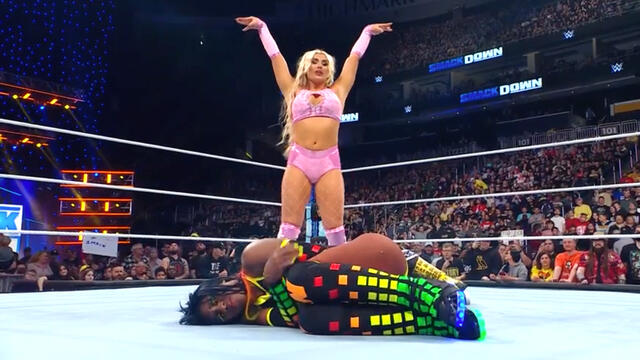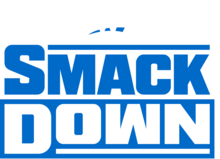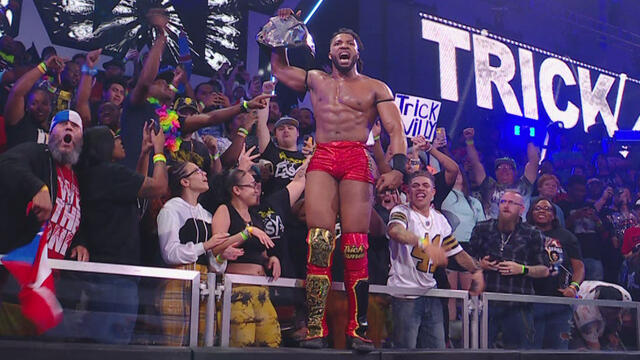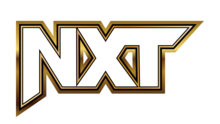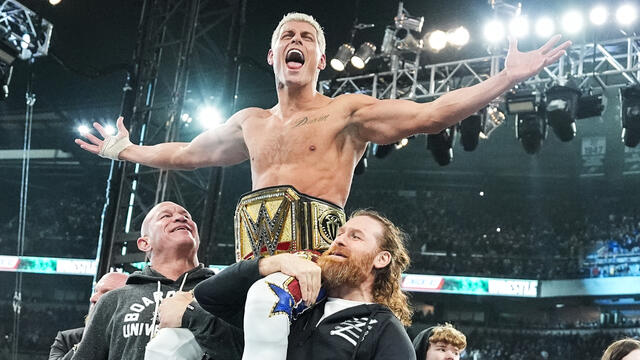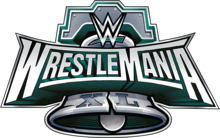
The 50 greatest stars in WCW history

WCW is the greatest rival WWE has ever faced. The Monday Night War is one of the most pivotal battles in the history of sports-entertainment. WCW’s success rested on the shoulders of experienced competitors and high-flying young ring warriors. With WWE's new show The Monday Night War heating up on WWE Network, WWE.com lists the Top 50 WCW Superstars of all time.
But before you pose quesitons like "What about Tully Blanchard???," take a moment to read the guidelines the WWE.com team followed when compiling this list.
1. Eligibility begins with Ted Turner’s purchase of WCW in 1988. Anything from Jim Crockett Promotions and NWA predating this is ineligible. We think Magnum T.A. is a boss, but he was never part of WCW from 1988-2001.
2. Competitors were rated only on their accomplishments while in WCW, so the achievements of Bret “Hit Man” Hart in WWE, for example, had no bearing on his placement.
3. Rankings were based on everything from longevity to cultural impact. Personal biases may have also crept in, as witnessed by a heated discussion over the significance of Glacier.
Okay, now that that's out of the way, here are the 50 greatest Superstars in WCW history as decided by a team of editors, a WWE Hall of Famer and the simple, widely-known fact that Sid is the ruler of the world.
Jump ahead to: #40 | #30 | #20 | #10
Jeff Jarrett
During his first tenure with WCW from 1996 to ’97, "Double J" was a member of The Four Horsemen and a United States Champion. But it was when he returned to Atlanta in ’99 that he made his biggest impact. Proclaiming himself "The Chosen One," Jeff Jarrett bashed countless guitars over opponents heads on his way to becoming a four-time WCW Champion.
Although accomplished, Jarrett is certainly one of the most polarizing figures in WCW history. In 1999, he led the formation of the nWo 2000 — a watered-down version of the original. The following year, he got in the middle of a rivalry between Hulk Hogan and WCW Executive Vince Russo and laid down in the ring for Hogan. Few moments in sports-entertainment were as disgraceful. When WWE purchased WCW in 2001, Mr. McMahon showed how he felt about Double J by publically firing him on Raw. — KEVIN POWERS
Juventud Guerrera
During the late-1990s, one of the mainstays of the Cruiserweight division was the intense and high-flying Juventud Guerrera. Early in his career, Juvi wore a mask, channeling his lucha roots in memorable battles with fellow-masked Cruiserweights Rey Mysterio and Psychosis. Guerrera eventually lost his hood in a Cruiserweight Title vs. Mask Match against Chris Jericho at SuperBrawl VIII.
However, the loss of his coveted mask did not faze the high-flying competitor. He continued to make a name for himself as one of the most recognizable faces among WCW’s Cruiserweights on both Monday Nitro and Thunder. A three-time Cruiserweight Champion, one-time IGWP Champion and a tag champ alongside Rey Mysterio, Juvi's jaw-dropping abilities and memorable matches with the likes of Dean Malenko made him a mainstay among WCW's high-flyers. — K.P.
Dennis Rodman
Once suspended from the NBA for kicking a courtside cameraman in the crotch, Dennis Rodman and his “bad as I wanna be” bravado gave WCW the sports page coverage it needed to become a legitimate part of the pop culture when he linked up with the New World Order in 1997. But the NBA Hall of Famer wasn’t just another grinning "Hollywood" Hogan lackey. Teaming with The Hulkster at both the ’97 and ’98 Bash at the Beach events, The Worm proved himself to be a charismatic antagonist in the ring. Still, it was a 1999 brawl against Randy Savage that brought out the best in Rodzilla. Battling the Macho Man in front of a crowd of rowdy bikers at the Sturgis motorcycle rally, Rodman ended up stuffed in a portable toilet that was then tipped over. Disgusting yes, but it proved just how far the big man was willing to go for sports-entertainment. — RYAN MURPHY
Meng
The Tongan warrior known as Meng was one of the most intimidating forces in WCW. From his time as Col. Parker’s bodyguard to his tenure in the Dungeon of Doom, the mighty savage was an immovable mountain of a man that no one wanted to face. His devastating Tongan Death Grip and martial arts abilities brought many competitors to their knees, begging for mercy. Throughout his years in WCW, he found himself embroiled in bitter rivalries with Sting and Road Warrior Hawk.
As a staple of WCW Nitro, Meng’s vicious kicks, brutal clotheslines and sweet ’fro were unmistakable. Oftentimes, young competitors looking to become full-timers were forced to face Meng in order to test their mettle and true desire.
Although he only held WCW’s Hardcore Championship, Meng was always willing to take on any and all challengers, making him one of WCW’s toughest — and most feared — warriors. — GREG SPRINGER
Larry Zbyszko
The self-proclaimed " Living Legend,” Larry Zbyszko was one of WCW’s most familiar faces for more than a decade both inside the squared circle and from the broadcast booth. Joining forces with Arn Anderson in 1991, the duo known as The Enforcers captured the WCW Tag Team Titles and joined Paul E. Dangerously's Dangerous Alliance. Upon his exit from the faction, Larry battled "Stunning" Steve Austin and Bobby Eaton before retiring from active competition and becoming the color commentator on Monday Nitro.
A staunch supporter of WCW during the company's struggle with The nWo, Zbyszko came out of retirement to battle the faction’s corporate leader, Eric Bischoff. By beating Sleazy-E at Starrcade, Larry released the black and white clad group's tight grip on Nitro and returned control of the program to WCW. Proving that he was WCW's elder statesman, the former TV Champion continued to compete on and off in 1999 and 2000. — K.P.
Kanyon
Who’s better than Kanyon? Nobody! So much so that he was rightfully dubbed the “Innovator of Offense” for his creative moveset and unparalleled ability to improvise in the squared circle. With original maneuvers like The Flatliner — a front Russian legsweep — Kanyon climbed the WCW ranks, becoming a two-time WCW Tag Team Champion as a member of The Jersey Triad alongside Diamond Dallas Page and Bam Bam Bigelow.
Kanyon debuted in WCW as the mysterious Mortis, a masked competitor decked in green and covered with skulls. His terrifying visage, though, would not hide his tremendous in-ring ability. Kanyon finally broke out from under his mask after Raven denied his attempts to join The Flock, Raven’s group of cronies. From there, the former U.S. Champion battled the likes of Saturn, Mike Awesome and, most notably, DDP, proving he was one of the toughest wrestlers in WCW. — JEFF LABOON
Bobby Eaton
A man of few words, Bobby Eaton was the anchor of one of the greatest tag teams in history, The Midnight Express. Whether teaming with Dennis Condrey or Stan Lane, Eaton was the glue that held the team together. He and Lane shocked The Four Horsemen by defeating Arn Anderson and Tully Blanchard in 1988 to capture the WCW Tag Team Titles.
Eaton’s prowess as a tag team competitor made him a sought-after partner. Beautiful Bobby formed successful teams with Anderson and William Regal, becoming a three-time WCW Tag Team Champion along the way. His explosive top-rope Alabama Jam legdrop brought him success in whatever he did in the ring, even as a singles competitor. At SuperBrawl I, no one gave him a shot against Arn Anderson in a Television Title Match. Beautiful Bobby, however, overcame the odds and upset Anderson in a classic bout to claim his only WCW singles championship. — BOBBY MELOK
Saturn
In 1997, Raven’s band of misfits known as The Flock added a former U.S. Army Airborne Ranger and ECW competitor to their ranks. Perry Saturn let his actions inside the ring speak for him as he acted as an enforcer for the filthy faction. His patented Death Valley Driver made him a formidable competitor as he captured the World Television Championship early in his WCW career. However, his no nonsense demeanor led to tension between he and Raven, and Saturn left the flock, striking out on his own.
A regular face on WCW Monday Nitro and Thunder, Saturn shared a memorable rivalry with Chris Jericho that resulted in Saturn being forced to wear a dress for 90 days. Before leaving WCW for WWE, Saturn captured the WCW Tag Team Titles on two occasions, further cementing his legacy in the Atlanta-based organization. — K.P.
Dustin Rhodes
The young, hardworking grandson of a plumber, Dustin Rhodes fully lived up to his nickname, “The Natural.” Among WCW’s most popular acts in the '90s, Rhodes seemed predestined for greatness from the very start, and he partnered frequently with fan favorites such as Barry Windham, Ricky Steamboat and Sting. He reliably took the fight to whichever baddies were terrorizing WCW at a given time, be it the York Foundation, Dangerous Alliance or Stud Stable.
A former two-time U.S. Champion and Tag Team Champion, Rhodes caught flak for being the son of NWA legend (and WCW power wielder) Dusty Rhodes. Almost as if it he sought out specifically to discredit claims of nepotism, Rhodes proved his mettle with intense battles against the likes of Steve Austin, Rick Rude and Arn Anderson. With bulldog tenacity (and the bulldog headlock as his finisher), Rhodes was a righteous, double-tough customer who never backed down from a challenge. — JOHN CLAPP
Bret "Hit Man" Hart
Bret “Hit Man” Hart made his highly publicized WCW debut two weeks before Starrcade 1997. The Excellence of Execution didn’t immediately make an impact, but he did make a decision as he aligned himself with WCW against The nWo. However, he soon became an associate of the faction before winning his first of four U.S Titles in 1998. Hart added to the significance of the already prestigious championship as many major WCW events were headlined by a U.S. Title bout rather than a WCW World Title contest.
In 1999, Hart captured his first WCW World Title by winning a tournament at Mayhem, defeating the likes of Sting, Saturn and Kidman. During his time as WCW Champion, he won the WCW Tag Team Titles with his nemesis, Goldberg. After losing the titles, the bitter rivals faced off at Starrcade 1999 for the WCW Championship in which Hart suffered a severe concussion. Although The Hit Man continued to compete and won a second World Title, the effects of his concussion caught up to him, prematurely ending the WWE Hall of Famer’s career. — K.P.
Kevin Sullivan
He’s remembered now as the cackling, bug-eyed sociopath who set out to bring an end to Hulkamania through his cartoonish Dungeon of Doom. But Kevin Sullivan was at his best when the Halloween theatrics of his Taskmaster persona were set aside in favor of the Boston bad boy who lurked underneath.
Southie tough with the type of accent best suited for hurling insults from the bleachers at Fenway, Sullivan stomped heroes like Brian Pillman and Cactus Jack with the Sam Adams-soaked rage of a Beantown bar fighter. When he wasn’t brawling in the women’s bathroom of Corpus Christi’s Memorial Coliseum (True story. Look it up.), Sullivan was calling the shots as one of WCW’s most vital power players. Turns out the man once billed from the “Iron Gates of Fate” wasn’t just stupid tough, he was wicked smart. — R.M.
Curt Hennig
If there is one lesson to be taken away from Curt Hennig’s tenure at WCW, it’s that perfection never rusts. Hennig’ time in WCW signified the in-ring renaissance of one of the ’90s best talents, who had been sidelined with a back injury for the better part of three years.
Courted by multiple factions upon his shocking WCW debut in June 1997, Hennig chose his alliances carefully and changed sides frequently. He enjoyed stints with The Four Horsemen and The nWo before forming his own stable, The West Texas Rednecks, whose rivalry with the Master P-led No Limit Soldiers produced the stunningly popular and infectious earworm, “Rap is Crap.”
In his three years there, Hennig captured the U.S. Championship and the WCW Tag Team Titles. His classics against DDP and Ric Flair reminded all of his in-ring brilliance, and a memorable Perfect-plex on the massive Giant proved that Hennig had returned not a moment too soon. — J.C.
Michael "P.S." Hayes
Very few people in the wrestling industry are made like Michael Hayes. An endlessly talented individual, his presence through the years in WCW was multi-dimensional as he found success as an in-ring competitor, manager, musician and commentator.
Of course, “P.S.” was universally known as the anchor of The Fabulous Freebirds. Breaking away from original partners Terry Gordy and Buddy Roberts, Hayes found success in the tag team arena in 1989 with a new Freebird by the name of “Gorgeous” Jimmy Garvin. Together, the cocky duo battled legendary teams like Doom and The Steiner Brothers during their reign as WCW Tag Team Champions. Hayes’ tremendous in-ring career ultimately came to an end in WCW, but the proud southerner kept it rocking until the final bell rang. — HOWARD FINKEL
Cactus Jack
The Hardcore Legend isn’t just an arbitrary nickname. Before Mick Foley smashed WWE rings, Cactus Jack terrified opponents in WCW with his unique blend of brutality and intensity.
After a six-month tenure from 1989-1990, Cactus returned in 1991 with a more vicious persona. Focusing on Sting, he formed an alliance with fellow wild man Abdullah the Butcher, and the pair competed in a shocking Chamber of Horrors Match at Halloween Havoc, which remains one of the most infamous bouts in sports-entertainment history.
Cactus battled Ron Simmons over the WCW Championship, but is mostly remembered for his rivalry against Vader ( FULL STORY). The punishment Foley endured — including a Texas Death Match in the main event of Halloween Havoc — ultimately endeared him to the fans, and he captured the WCW Tag Team Championship before departing in 1994. He became a worldwide sensation as Mankind in WWE, but Foley’s true notoriety began in WCW. — ZACH LINDER
Ultimo Dragon
Some of WCW’s best Cruiserweights left fans scratching their heads. (What the hell was a Super Calo anyway?) Ultimo Dragon’s appeal was more easily understood. Striding to the ring with the eight titles of Japan’s coveted J-Crown draped across his body, Ultimo Dragon looked like an anime character come to life. He wrestled like one too.
Graceful and devastating somehow all at once, the grappler who split his time between Mexico and Japan utilized aerial attacks like his patented Asai Moonsault and ground based submissions like the Dragon Sleeper in pursuit of the Cruiserweight and Television Titles during his more than two years in WCW. A two-time holder of each title, Ultimo Dragon thrilled in bouts against Chris Jericho, Dean Malenko and Eddie Guerrero before an arm injury nearly brought an end to his career. It was an oddly humanizing end to the hero’s WCW run, but it didn't make him any less phenomenal. — R.M.
Lord Steven Regal
There was a time when Americans thought English guys were nothing but a bunch of mincing Hugh Grants with funny accents and questionable oral hygiene. Then Steven Regal came along. European uppercutting his way out of the seaside circuses of dodgy Blackpool, the aggressive blue blood looked the proper gentleman in his spotless cravat and houndstooth blazers, but he wrestled with all the refinement of a Manchester soccer hooligan. Mixing equal parts Snake Pit submissions and carnie survival tricks, the four-time Television Champion bested Ricky “The Dragon” Steamboat, fought Fit Finlay in a parking lot and left Bill Goldberg embarrassingly befuddled in the center of the ring on live television. Us Yanks haven’t looked at the Brits the same way since. — R.M.
Konnan
WCW’s initiative to introduce international stars to a American audiences brought a Mexican pop culture icon by the name of Konnan north of the border in 1996. Already a decorated competitor in his home country, he added the U.S. Title to his mantle shortly after his arrival. From there, Konnan joined Kevin Sullivan’s evil Dungeon of Doom and adopted a new look, embracing the Mexican street culture.
However, it was after Konnan joined The nWo that he reached unthinkable levels of popularity. K-Dawg served as the hypeman for the outlaw group, riling up crowds and showing them how to be “’bout it, ‘bout it and rowdy rowdy.” He also proved himself to be a true leader, taking charge of groups like Master P’s No Limit Soldiers and The Filthy Animals. Whether he was good or evil, Konnan engrained himself in the minds of WCW fans forever. Odelay! — B.M.
Terry Funk
No list of top grapplers in any organization that Terry Funk competed would be complete without the unpredictable Texan.
Then in his mid-40s, Funk arrived in WCW in 1989, reinvented himself, and helped carry an entire organization. At the same time, he reinvigorated Ric Flair, then the WCW Champion, and the two WWE Hall of Famers had one of the most compelling rivalries that WCW ever produced. One of the greatest bouts I’ve ever had the privilege of calling was the infamous “I Quit” Match between Funk and Flair at a Clash of the Champions where I teamed with the great Gordon Solie on commentary.
Funk could talk, he could both wrestle and brawl, and he was as good as anyone who ever laced their boots in every phase of the game. Plus, Terry was an amazing television commentator while in WCW. Without question, Terry Funk is one of the greatest to ever represent WCW — or any organization for that matter — JIM ROSS
Lance Storm
If we can be serious for a minute, no one made an impact in WCW quite like Lance Storm.
Less than two months after debuting, Storm had captured the United States Championship, WCW Hardcore Championship and Cruiserweight Championship, becoming the first grappler in WCW’s history to hold three titles simultaneously. Honoring his roots, he adorned his trophies with Canadian flag stickers, renaming them the Canadian Heavyweight Championship, the 100kg and Under Championship and the Saskatchewan Hardcore International Title.
Storm also formed Team Canada, whose membership curiously included Americans like “Hacksaw” Jim Duggan and Mike Awesome, and engaged in memorable rivalries with the Misfits in Action and Filthy Animals. He even had a brief stint as WCW’s Commissioner, and was the first participant in WCW’s Invasion of WWE in Storm’s hometown of Calgary, Alberta, Canada. — Z.L.
The Great Muta
During the 1980s and ’90s, it was common to see wrestlers from Japan grapple with American competitors. Arguably the most memorable — and the first to gain popularity in the United States — was The Great Muta.
Hailing from Tokyo, Japan, Muta’s epic battles with WCW’s face-painted franchise, Sting, are what truly gave rise to his legend. He typically only faced WCW’s top ring warriors in addition to The Stinger, including Ric Flair, Lex Luger and Arn Anderson. Capturing the WCW Television Championship in 1989, Muta helped pave the way for other Japanese competitors to find success in America. Competing primarily in New Japan throughout the 1990s, Muta’s ties to WCW remained strong, both battling and joining the Japanese branch of the New World Order.
While his stints in WCW were always somewhat brief, his impact on the entire world of sports-entertainment was immeasurable. — K.P.
Raven
What about Raven?
A spoiled rich kid who sulked in corners and hid behind a band of toadies he dubbed The Flock, Raven could be as loathsome and emotionally draining as a Smiths record, but few competitors were as psychologically captivating as this Bowery punk. A key figure in ECW’s rise to cult status in the mid-90s, the skuzzy brawler saw to it that all his WCW bouts were contested under Raven’s Rules when he joined the Atlanta organization in ’97. Of course, that only meant that there were no rules.
Free to wreak his particular brand of Philly havoc, the grunge rock Svengali busted more stop signs than a runaway school bus as he abused Perry Saturn and beat Diamond Dallas Page for the United States Title. Too often, Raven walked away from his challenges. But few competitors were as enthralling as him when he stayed to fight. — R.M.
Kidman
The fact that Billy Kidman won the WCW Cruiserweight Title while wearing a tank top and jean shorts didn’t make him great — although it did make him kind of awesome. What made the skinny kid from Allentown, PA special was the way he entered into a division dominated by the world’s greatest high flyers and made his mark regardless of the fact that he never competed in a Super J-Cup or sold out Arena México.
Kidman may have lacked the international pedigree of an Ultimo Dragon, but he made up for it with raw nerve and a Jushin Liger-inspired Shooting Star Press that was so audacious even some of the top Cruiserweights dared not attempt it. Going from Raven’s flunky to Hulk Hogan’s rival in a little more than a year, Kidman proved that a stacked resume is nice, but guts are more important.— R.M.
Buff Bagwell
In 1991, WCW was introduced to a handsome stranger by the name of Marcus Alexander Bagwell. The rookie made an immediate impact on the roster, drawing the ire of Paul E. Dangerously’s Dangerous Alliance.
Bagwell would go on to win the WCW Tag Team Championships with four different partners, proving his worthiness to the team sport. These accomplishments impressed the infamous nWo — a faction he would eventually join. The confidence and cockiness of Buff Bagwell was a perfect fit for the nWo and their way of life, and Buff certainly proved that he had the stuff.
In 1998, Bagwell suffered a broken neck that nearly ended his career. However, he showed his resilience and passion for his craft by making a full recovery and returning to active competition until the demise of WCW in 2001. — MATT ZIMMER
Chris Jericho
Before Chris Jericho broke the walls down in WWE, he was a key part of WCW’s renowned Cruiserweight Division. No less arrogant than he is today, The Ayatollah of Rock ‘n’ Rolla backed up his brashness by being the first man the hold the Cruiserweight Championship on four occasions.
As technically gifted as Jericho was in the ring, his skills on the microphone catapulted him to greatness. While entangled in a rivalry with “The Man of 1,000 Holds” Dean Malenko, Jericho anointed himself “The Man of 1,004 Holds” in a memorable Nitro moment. He also earned ire by mocking foes’ names, referring to Raven as “Raisin” and Juventud Guerrera as “Hoot ‘n’ Toot.”
When Jericho made his highly anticipated debut in WWE, his arrival was significant due to his tremendous ability to entertain as showcased in WCW. It’s just too bad he didn’t bring his toothless security guard, Ralphus, with him. — Z.L.
Rick Rude
“Ravishing” Rick Rude showed a new aggression upon his arrival in WCW in late 1991. Making an impactful debut at that year’s Halloween Havoc, he competed as the masked WCW Phantom and demolished Tom Zenk in minutes. When he revealed his identity later that night, Rude became the centerpiece of Paul Heyman’s Dangerous Alliance. With a newfound rage and Heyman at his side, Rude was unstoppable.
Just weeks into his WCW tenure, he steamrolled over Sting to capture the United States Championship, which he held onto for more than a year. He then set his sights on Ric Flair and the WCW International World Championship. Rude got into The Nature Boy’s head by putting the moves on his valet, Fifi. The Ravishing One’s mind games worked, as he defeated Flair to win the title. This perfect combination of fury and cunning made Rude a force to be reckoned with in WCW. — B.M.
Eric Bischoff
It can be argued that no one was more integral to WCW’s success than Eric Bischoff. Joining WCW as an announcer, Bischoff was savvy from the very beginning as he moved into Bill Watts’ Executive Producer vacancy — a role widely perceived to be awarded to Jim Ross or Tony Schiavone.
He was soon promoted to Executive Vice President, took control of WCW and eventually became the company’s President. Among Bischoff’s game-changing contributions included substantially growing the budget to compete with WWE and the revolutionary concept of The nWo. He began the “Monday Night Wars” with the creation of Monday Nitro — a battle Bischoff won for 86 straight weeks. In the wake of the nWo’s success, Bischoff emerged as its evil power hungry dictator, becoming sports-entertainment’s first villainous authority figure.
While Bischoff many not have won himself many personal fans, his influence in the landscape of sports-entertainment remains to this day. — Z.L.
Ricky "The Dragon" Steamboat
In January of 1989, Ricky “The Dragon” Steamboat made his WCW debut after competing in WWE from 1985 through 1988. Steamboat had previously competed for Jim Crockett Promotions before going to WWE, but his surprise appearance in a tag team match with Eddie Gilbert against Ric Flair & Barry Windham earned him an NWA Title opportunity against The Nature Boy. At the Chi-Town Rumble that same year, Steamboat defeated Flair to capture the championship. The two WWE Hall of Famers battled over the title for the remainder of that year, with Steamboat ultimately dropping the title back to his rival.
From there, Steamboat captured WCW’s tag titles, the Television Championship, and a United States Championship, while engaging in long rivalry with “Stunning” Steve Austin. The Dragon is undoubtedly one of the most elite competitors of all time, and it’s safe to assume that win, lose or draw, if you were an opponent of Steamboat, you knew that you were going to be in for a battle. — H.F.
Barry Windham
The son of Blackjack Mulligan has been called one of the best athletes ever to step foot inside a ring. That was obvious from the moment he joined WCW as he captured the WCW Tag Team Titles and the United States Title in 1988. Using his father’s trademark Claw and a picture-perfect Superplex, the 6’7” stud racked up victories over Bam Bam Bigelow, Nikita Koloff and Dusty Rhodes.
Windham left WCW for WWE in 1989, but returned as 1990 began. He picked up right where he left off, joining The Four Horsemen until Ric Flair’s departure led to their dissolution. His tag team with Dustin Rhodes had one of the most memorable matches in WCW history at a November 1993 Clash of the Champions against Ricky Steamboat and Shane Douglas. He also found success on his own, reaching the peak of sports-entertainment by defeating The Great Muta for the NWA World Title in 1993. — B.M.
Rey Mysterio
At The Great American Bash 1996, a young luchador named Rey Mysterio made his WCW debut and challenged Dean Malenko for the Cruiserweight Championship. WCW fans were immediately thrilled by the high-flying competitor whose colorful attire added to the excitement of his jaw-dropping abilities.
His thrilling rivalries with Psychosis, Chris Jericho and Eddie Guerrero made the San Diego-native the most popular flyer in the Atlanta-based organization as he became the face of the Cruiserweight division and a five-time champion. However, Mysterio wasn’t limited to Cruiserweight competition and stood up to challenges from larger competitors, earning victories against the likes of Kevin Nash and Scott Norton The “Giant Killer” even challenged Ric Flair for the WCW World Title in 1999. Mysterio went on to become a member of both The No Limit Soldiers and Filthy Animals and won the WCW Tag Team Titles twice before the end of WCW in 2001. — K.P.
Rick Steiner
Rick Steiner was never one to mince words. “If you don’t like me, bite me,” he often exclaimed.
The elder Steiner may not have had the flashy moves his brother, Scott, utilized. However, his unabashed use of brute force made him a mainstay in WCW. The University of Michigan wrestling standout was introduced to fans as a member of Kevin Sullivan’s Varsity Club, where he teamed with former Syracuse grappler Mike Rotundo. Sullivan and Rotundo took advantage of Rick’s kind-hearted nature, leading to “The Dog Faced Gremlin” venturing out on his own and defeating Rotundo for the Television Title.
Soon after, Rick was joined by Scott, and the two embarked on one of the most successful tag team runs in sports-entertainment history. Rick’s power and mat skill complemented Scott’s agility and helped the pair pick up seven WCW Tag Team Championships, overcoming teams like Harlem Heat, The Fabulous Freebirds and The Outsiders. — B.M.
Brian Pillman
Brian Pillman was special. Arguably one of the greatest overachievers in the genre, he had an insatiable desire to be a wrestling star. Fate and injuries prevented that from occurring over the long haul for “Flyin’” Brian, but while his star did shine, it was brilliant.
I helped bring the undersized All American defensive lineman to WCW in 1989 from Calgary. During the “Loose Cannon’s” time in Atlanta, he turned heads athletically and with some of the era’s most riveting and compelling promos. Brian’s bouts with Jushin “Thunder” Liger were extraordinary as was his tag team with Steve Austin. Brian Pillman had one of the highest IQ’s I’ve ever encountered and was a creative genius. For those of us that loved Brian, he will never be forgotten. And if fate had dealt him a different hand, more of today’s fans would realize just how great Brian Pillman truly was. — J.R.
The Giant
When it comes to big men in the world of sport-entertainment, no one can match the ability possessed by the seven-foot monster, The Giant. Today the WWE Universe knows him as Big Show, but early in his career, The Giant moved around the squared-circle like a cruiserweight, executing dropkicks and even jumping from the top rope.
Making his WCW debut in 1995, The World’s Largest Athlete immediately went after Hulk Hogan and his World Title. In his very first match at Halloween Havoc, The Giant was able to overcome the champion and become WCW’s biggest villain. After being forced to vacate the title, The Giant would eventually regain the prestigious championship, this time dethroning Ric Flair while joining a short list of competitors who defeated Hogan and Flair for a major title. During his WCW tenure, The Giant was also a three-time tag champ and the winner of the 1996 World War 3 battle royal. — M.Z.
Eddie Guerrero
Eddie Guerrero may not have been born great, but he was raised to be. The youngest son of Gory Guerrero — the Vlad Dracula of Mexican wrestling — little Eduardo was rolling around in the ring before he was old enough to brush his own teeth. By the time he arrived in WCW in 1995, he was an international wunderkind who had enraged the Mexican faithful as a brash member of Los Gringos Locos and thrilled the Japanese under the mask of Black Tiger. In Atlanta, he became United States Champion, but he’s best remembered as a swaggering cruiserweight who nearly unmasked Rey Mysterio before leading a luchador uprising he dubbed the Latino World Order. Eddie achieved far greater things in WWE, but his best nights in WCW were a thrilling sign of things to come. — R.M.
Arn Anderson
Whether he was known as “The Enforcer” or “Double A,” Arn Anderson’s name was always synonymous with WCW. Gaining the respect of his peers through hard-fought success, Anderson spent years in WCW’s predecessor, Jim Crockett Promotions, raising hell with Ric Flair and the rest of The Four Horsemen. After a brief stint in WWE, Double A returned to what had become WCW and branched out on his own.
He almost immediately captured the WCW Television Title, then formed championship teams with both Larry Zbyszko and Bobby Eaton. Anderson was also a bit of a hired gun. His ability to inflict pain in the squared circle made him a reliable hand for both Paul Heyman’s Dangerous Alliance and Col. Rob Parker’s Stud Stable. Inevitably, though, he wound up with Ric Flair once again, re-forming The Horsemen for one last run before injuries forced him into retirement. — B.M.
Ron Simmons
Decades before he became a WWE Hall of Famer, Ron Simmons was making history. The collegiate football standout changed the landscape of sports-entertainment in 1992, becoming the first African-American to capture a major World Heavyweight Championship. Winning a raffle to fill a vacant spot to challenge for the WCW Title, Simmons entered the ring, scoop slammed then-champion Vader and changed the world.
However, before he changed the wrestling game, the powerhouse from Warner Robbins, GA., made up one half of Doom with “Hacksaw” Butch Reed and won the WCW Tag Team Championships with the aid of their manager, Theodore Long. But it is Simmons’ breakthrough as World Heavyweight Champion that many Superstars cite as inspiration to be involved in the world of sports-entertainment. So, while WWE fansmay remember him for being a wrecking ball in The APA, understand that Ron Simmons paved the way for Superstars like The Rock, Booker T, and Mark Henry. Damn! — G.S.
"Stunning" Steve Austin
By now we all know the story — the busted tricep, the dismissive FedEx from Eric Bischoff, the glorious rebirth in WWE — but let’s not overlook the time before Steve Austin turned “Stone Cold.”
Then an overconfident neophyte with thinning blond hair and neon bicycle shorts, Austin may have looked like a Venice Beach con artist, but he wrestled with the unmistakable spitfire of a Texas kid chasing his dream. Excelling in both the singles and tag ranks, “Stunning” Steve traded the Television Title with WCW greats like Barry Windham and Ricky Steamboat, but he was at his best alongside the fantastic Brian Pillman. Joined together as The Hollywood Blonds, the hungry young competitors took an impromptu pairing and made tag team history as they topped the likes of The Dragon & Shane Douglas during their reign as champions. Sports-entertainment immortality awaited Austin in WWE, but this wasn’t such a bad start. — R.M.
Sid
Even as a member of the legendary Four Horsemen, it was clear that Sid Vicious was his own man. Billed from “Wherever He Damn Well Pleases,” the big man did what he wanted when he wanted.
After jumping from WCW to run roughshod over the WWE roster, Sid returned to terrorize once again, taking on the likes of Kevin Nash, “Hollywood” Hogan and Goldberg. At Road Wild 1999, the so-called “Millennium Man” pinned Sting in a decisive, career-defining matchup. The following month, he won the United States Championship, and became a two-time WCW Champion within the span of two days in January of 2000. He held the title until all championships were vacated during WCW’s reboot in April.
Say what you will about one of the most polarizing performers in sports-entertainment history. One thing’s for sure — Sid ruled the world. — Z.L.
Dean Malenko
Dean Malenko may have been one of the smaller competitors in WCW, but that didn’t make him any less dangerous. Having traveled the world before arriving in Atlanta, he learned many different ways to stretch opponents to submission. His encyclopedic knowledge of moves led to a nickname being bestowed upon him — The Man of 1,000 Holds.
Malenko’s mat wrestling prowess made him the perfect foil for the high-flying aerial artists of WCW’s burgeoning Cruiserweight division. The Iceman had WCW fans on the edge of their seats as he tried to wrench the sinews and tear the tendons of stars like Rey Mysterio, Psychosis and Eddie Guerrero.
By the time he left WCW, Malenko had racked up four reigns as Cruiserweight Champion, one United States Championship, and a place in history as an esteemed member of The Four Horsemen. — B.M.
Scott Hall
Hey, yo! It's survey time again. Who’s the competitor that turned sports-entertainment upside down when he appeared on WCW Monday Nitro in 1996 while still presumably under contract with WWE? Was it Jerry Flynn? Or was it the man who’s more handsome than 10 movie stars, big Scott Hall? Survey says, "One more for the ‘Bad Guy’!"
Formerly known as Razor Ramon in WWE, Hall was the first major Superstar to unexpectedly appear on Nitro. This shocking turn of events pushed Hall to the frontlines of the Monday Night Wars as his foundation of The New World Order alongside Kevin Nash and Hulk Hogan resulted in record television ratings for WCW. During his impactful time in Atlanta, Hall was a Television Champion, a two-time United States Champion and a seven-time WCW Tag Team Champion. The talented performer wasn’t always in prime condition, but few were better than the Bad Guy when he was on his game. — K.P.
Big Van Vader
Straight from the Rocky Mountains came The Man They Call Vader. Sporting arms the size of small children and a web of red straps gripping his face, The Mastodon was as imposing as they come.
Employing the legendary Harley Race as his manager, Big Van Vader manhandled Sting to win the WCW Championship at The Great American Bash in 1992 and began a reign of terror he dubbed “Vader Time.” He won the title twice more — once after losing it only six days prior — but these accolades were not Vader’s only triumphs. His vicious rivalry with Cactus Jack set new standards for brutality ( FULL STORY), and he kicked out of Hulk Hogan’s immortal legdrop with authority before executing a Vader Bomb onto The Hulkster in a memorable bout at SuperBrawl.
Vader towered over his opponents. Vader dominated the competition. But most importantly, Big Van Vader was the man. — Z.L.
Scott Steiner
In 1986, a University of Michigan wrestler named Scott Steiner became an NCAA Division I All-American. Three years later, that competitor captured the tag titles alongside his brother Rick in WCW en route to becoming arguably the greatest duo in the organization’s history. If he were judged on his physique alone, Steiner would appear to be just another powerhouse, but his amateur background and creativity in the squared circle presented a challenger with a skill set not often seen in a grappler of his stature.
Steiner joined The nWo in '98 and adopted the moniker “Big Poppa Pump.” Drastically changing his appearance and muscle mass, he became the most physically imposing wrestler in WCW. The Genetic Freak held a number of titles during his WCW career, including seven WCW Tag Team Titles and the WCW World Title. A volatile and physically dominating competitor, Steiner is certainly one of WCW’s most memorable characters. “Holla, if ya hear me!” — K.P.
"Macho Man" Randy Savage
“Randy always treated his opponents as if they were on the same level,” Diamond Dallas Page once told WWE.com. “You were always at a main event level when you stepped into the ring with ‘Macho Man.’”
A famously intense and fearless competitor, Savage captured the first of his four WCW World Championships by winning the inaugural World War 3 60-man, three-ring battle royal in 1995. Although he first stood up to The nWo, Savage eventually joined them in 1997, engaging in a physical rivalry with Diamond Dallas Page that highlighted the struggle between WCW and The nWo.
The Madness remained at the top of his game in The nWo, eventually sparking Hogan’s jealousy over the World Title, prompting Savage to form the nWo Wolfpac alongside Kevin Nash. After a hiatus due to injury, Macho Man returned in 1999, once again winning the World Championship and commanding the respect of his opponents. — K.P.
Booker T
Booker T was arguably the most decorated Superstar in WCW. His tenure in the Atlanta-based organization began in 1993 and lasted until WCW’s demise in 2001, making him one of the few major competitors that never left the promotion during the Monday Night Wars. His prestigious career began as a member of Harlem Heat alongside his brother, Stevie Ray. One of the top tag teams in history, the duo held the WCW Tag Team Champions a record 10 times.
While Stevie Ray recovered from an injury, Booker T began his successful career as a singles competitor. Collecting the Television Championship, U.S. Championship, and the WCW World Championship, Booker became one of a select few who achieved the Triple Crown in WCW. To round out his history making career, Booker T became the second African-American to hold the prestigious World Heavyweight Championship after Ron Simmons. There is no doubt that Booker T belongs amongst the greats of WCW. Now can you dig that, sucka? — G.S.
Lex Luger
A star in WCW from the very beginning, Lex Luger’s unmatched power and impressive physique made him a formidable force inside the squared circle. Both an ally and an enemy of The Four Horsemen early on, Luger became a dominant United States Champion. During his third run with the title, The Total Package set the record as longest reigning U.S. Champion at 523 days. After losing and regaining the title in 1990, he held the title for an additional 210 days before vacating it after winning his first WCW World Championship.
Throughout his career, The Total Package shared a close friendship with Sting, often teaming with WCW’s face-painted franchise and once winning the tag team titles. In 1997, Luger was the first WCW wrestler to defeat “Hollywood” Hogan for the World Title, reclaiming The nWo branded championship for WCW. — K.P.
Diamond Dallas Page
The story of Diamond Dallas Page’s wrestling career has been well-documented over the years, but no one could have guessed that the former manager would become one of WCW’s greatest competitors. Beginning his WCW career managing The Fabulous Freebirds, Page soon entered active competition and formed his own faction known as The Diamond Mine.
However, as DDP can attest, it was his defiance of The New World Order and his legendary rivalry with “Macho Man” Randy Savage in 1997 that truly launched his career. During his battles with Savage, DDP showed a willingness to defend the honor of his wife Kimberly. No matter what the odds, Page never backed down from a fight. It was that fortitude that earned him the moniker of WCW’s “People’s Champion” and helped him become a “three-time, three-time, three-time” WCW Champion, four-time tag team champion, two-time U.S. Champion and a one-time TV Champion. — K.P.
Kevin Nash
Along with Scott Hall, Kevin Nash’s unexpected appearance on WCW Monday Nitro in 1996 is often credited with raising the Monday Night Wars to a fever pitch. A founding member of both The nWo and The nWo Wolfpac, Big Sexy’s WCW career actually began in 1990. He competed as Steel, Oz and Vinnie Vegas before leaving the Atlanta-based organization in favor of WWE.
Returning to WCW alongside Hall, the duo declared war on the WCW locker room. Instrumental in the formation of The nWo, Nash helped change the landscape of sports-entertainment forever. However, the seven-footer’s success goes beyond the revolutionary New World Order. Nash is a five-time WCW Champion with his first title victory controversially ending Goldberg’s undefeated streak. He captured the WCW Tag Team Titles nine times — seven with Hall, once with Diamond Dallas Page and once with Sting. Nash was also the winner of 1998’s World War 3. With accolades like these, Big Sexy is without a doubt one of the most influential figures in WCW history. — K.P.
Goldberg
173. That's how many conquests Bill Goldberg notched during his astounding 462-day undefeated streak in WCW.
The former NFL defensive tackle-turned-World Heavyweight Champion plowed through Hugh Morrus on Sept. 22, 1997, and gained momentum weekly with the indiscriminate obliteration of Raven, “Hollywood” Hogan, Curt Hennig and a lion's share of The New World Order roster. Speared like hunted prey, all near-200 challengers were left a collective tackled mass, while Goldberg Jackhammered his way to breaking new ground in wrestling.
By the time The Undertaker had accrued six wins at WrestleMania in WWE, Goldberg was more than 400 days into his impressive streak. Everyone in the Atlanta-based organization and around the world started to ask who would be next on the gladiator's exponentially growing list of crossed out names.
“Who’s next?” soon became “what’s next?” as the intense titan with incalculable strength amassed boons and recognition the likes of which few WCW warriors ever attained. — CRAIG TELLO
"Hollywood" Hogan
The sports-entertainment game changed when Hulk Hogan joined WCW in 1994. Getting a fresh start in Atlanta, The Hulkster hit pay dirt in his first WCW match, winning the WCW World Heavyweight Championship from Ric Flair at Bash at the Beach. Expectedly, Hogan became one of the organization’s most popular competitors, aligning with WCW mainstays like Sting and engaging in a memorably bizarre rivalry with Kevin Sullivan’s Dungeon of Doom.
However, The Hulkster truly revolutionized sports-entertainment at the 1996 Bash at the Beach. As Scott Hall and Kevin Nash waged war on WCW, Hogan turned his back on the organization and millions of Hulkamaniacs by joining The Outsiders to form The New World Order. Their union put WCW on the map as Hogan basked in the jeers that his villainous “Hollywood” persona elicited on his way to becoming a six-time WCW Champion. — H.F .
Ric Flair
Already a sports-entertainment icon by the time Ted Turner launched WCW, Ric Flair continued along his path of success in the Atlanta-based promotion. Legendary rivalries with the likes of Sting, Ricky Steamboat and Lex Luger defined The Nature Boy’s reputation as one of the country’s best competitors and his seven reigns as WCW Champion gave him further ammunition for his freewheeling interviews.
Although Flair left WCW in favor of WWE in ’91, he returned home in 1993 and went right back to styling and profiling as the leader of The Four Horsemen. When The New World Order’s power expanded, Flair went after Eric Bischoff, defeating The nWo’s corporate leader to become WCW President in 1998. Flair remained a major player until the last episode of Monday Nitro where he battled his longtime rival Sting in an emotional sendoff for WCW. — B.M.
Sting
There is no face more recognizable or more closely associated with WCW than the man called Sting. Making his NWA/WCW debut in 1987, The Stinger remained with the Atlanta-based organization until it was acquired by WWE in 2001. Dubbed “The Franchise of WCW,” Sting was one of the few major stars to never join WWE, remaining one of WCW’s most popular grapplers throughout his career. Once sporting colorful face-paint and ring attire, the charismatic competitor went through a drastic transformation in 1996, becoming a silent avenger of WCW as The nWo’s power expanded. With his baseball bat in tow, Sting descended from the rafters to disrupt the plans of “Hollywood” Hogan and the nefarious faction.
Throughout his tenure, The Stinger amassed six WCW World Titles, three WCW Tag Team Championships, two WCW International World Titles and two United States Championships before battling his longtime rival Ric Flair on the final Nitro. — K.P.
WWE Shows Latest Results
SmackDown results, April 19, 2024: Tiffany Stratton introduces Bayley and Naomi to Tiffy Time with a sneak attack
Full ResultsNXT Spring Breakin' 2024 Week One results: Trick Williams slays The Mad Dragon to become NXT Champion
Full Results
















































